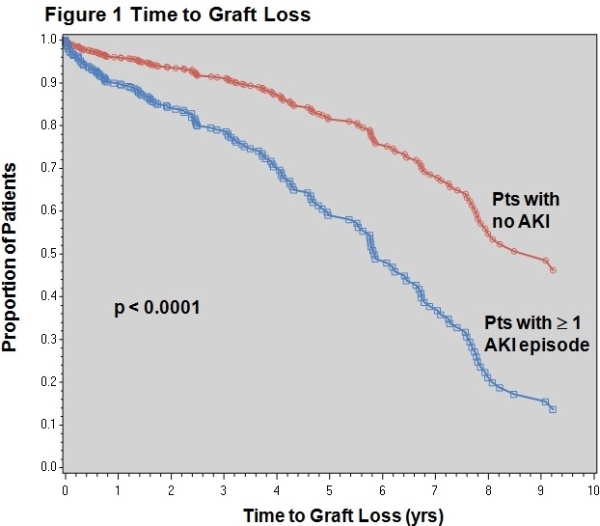Etiologies and Long-Term Outcomes of Acute Kidney Injury in Older Kidney Transplant Recipients
Medical University of South Carolina, Charleston, SC.
Meeting: 2018 American Transplant Congress
Abstract number: D83
Keywords: Graft failure, Renal dysfunction, Renal failure, Renal injury
Session Information
Session Name: Poster Session D: Kidney Complications: Late Graft Failure
Session Type: Poster Session
Date: Tuesday, June 5, 2018
Session Time: 6:00pm-7:00pm
 Presentation Time: 6:00pm-7:00pm
Presentation Time: 6:00pm-7:00pm
Location: Hall 4EF
Older kidney transplant recipients face challenges of post-transplant complications related to frailty and comorbidity burden. They are particularly vulnerable to acute kidney injury (AKI) due to various etiologies. This study elucidates etiology of AKI and long-term outcomes in older kidney transplant recipients.
Methods: Retrospective analysis of 500 patients age ≥ 60, who underwent kidney transplantation from 2005-2015. AKI was defined as an acute increase in serum creatinine ≥ 25% from baseline levels. Demographic characteristics and transplant data were collected. Manual chart abstraction was conducted to determine etiologies of AKI and outcomes. Analyses of etiology of AKI and outcomes were conducted using univariate statistics and multivariable Cox regression modeling.
Results: Mean age of older kidney transplant recipients was 66 years (range 60-81). 59% were males and 50% were African-American. 49% had CKD due to DM. 56% of older kidney transplant recipients had at least one AKI episode post-transplant. Significant risk factors for the development of AKI included DGF (HR=1.6 [CI 1.1-2.2]), older donor age (HR=1.02 [CI 1.01-1.02]), African American donor (HR=1.3 [CI 1-1.7]), and tacrolimus variability (HR=1.01 [CI 1-1.02]). The most common etiologies for AKI were infection (9 events per 100 patient-years), dehydration (7 per 100 patient-years), and GI complications (6 per 100 patient-years). Kidney transplant recipients who developed at least one AKI episode had a 2.6 fold higher risk for graft loss ([CI 1.7-3.8], p<0.001) (Figure 1). In particular, AKI events due to rejection, infection, dehydration, surgical complications, and cardiovascular events significantly correlated with graft loss (p<0.05).
Conclusion: Post-transplant AKI in older kidney transplant recipients is common and often due to infection and dehydration. These events are substantial risk factors for graft loss and thus dictate long-term graft outcomes. Addressing modifiable risk factors and alleviating comorbidities that contribute to AKI in older kidney transplant recipients may significantly improve long-term graft outcomes.
CITATION INFORMATION: Rodriguez R., Amechi P., Rao V., Taber D., Posadas Salas M. Etiologies and Long-Term Outcomes of Acute Kidney Injury in Older Kidney Transplant Recipients Am J Transplant. 2017;17 (suppl 3).
To cite this abstract in AMA style:
Rodriguez R, Amechi P, Rao V, Taber D, Salas MPosadas. Etiologies and Long-Term Outcomes of Acute Kidney Injury in Older Kidney Transplant Recipients [abstract]. https://atcmeetingabstracts.com/abstract/etiologies-and-long-term-outcomes-of-acute-kidney-injury-in-older-kidney-transplant-recipients/. Accessed February 14, 2026.« Back to 2018 American Transplant Congress

